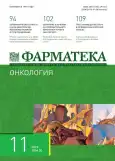Efficacy of the combination of pembrolizumab and axitinib in the treatment of renal cell carcinoma associated with chronic kidney disease
- Authors: Trofimtseva T.N.1, Yarovoy S.K.2, Gritskevich A.A.3,4, Baytman T.P.3,4
-
Affiliations:
- Moscow Loginova Clinical Research Center
- Lopatkin Research Institute of Urology and Interventional Radiology– Branch of the National Medical Research Radiological Center
- Vishnevsky National Medical Research Center for Surgery
- Patrice Lumumba Peoples’ Friendship University of Russia
- Issue: Vol 30, No 11 (2023)
- Pages: 31-36
- Section: Original articles
- Published: 22.10.2023
- URL: https://journals.eco-vector.com/2073-4034/article/view/625752
- DOI: https://doi.org/10.18565/pharmateca.2023.11.31-36
- ID: 625752
Cite item
Abstract
Background. Information on choosing the optimal treatment regimen for renal cell carcinoma (RCC) associated with chronic kidney disease (CKD) is limited. It seems relevant to study the actual practice of providing oncological care to patients suffering from RCC against the background CKD.
Objective. Evaluation of the effectiveness and safety of therapy for renal cell carcinoma (RCC) against the background of CKD with a combination of pembrolizumab and axitinib.
Methods. A retrospective study with the participation of 194 patients with RCC against the background of CKD who received treatment at the Pletnev City Clinical Hospital in 2020–2022 was carried out. Patients were divided into groups according to the IMDC prognostic model and renal function status. The control group consisted of similar patients with conditionally preserved renal filtration function. The effectiveness of therapy was assessed by median progression-free survival (PFS) and overall survival (OS).
Results. The probability of complete or partial response, as well as OS with a favorable and intermediate prognosis in patients with concomitant CKD were comparable with the control group (P>0.05). The negative impact of CKD can be seen only with an unfavorable prognosis, where the probability of progression was higher than in the control group (21.4 and 7.7%, respectively; P<0.05). Side effects requiring discontinuation of therapy were observed in 5.9–8.8% of patients without significant differences between groups (P>0.05).
Conclusion. In CKD (stage II–III), RCC therapy, including pembrolizumab and axitinib, demonstrated comparable efficacy and safety compared to patients with conditionally preserved renal function.
Full Text
About the authors
T. N. Trofimtseva
Moscow Loginova Clinical Research Center
Email: bit.t@mail.ru
ORCID iD: 0009-0001-9324-878X
SPIN-code: 9204-9426
Russian Federation, Moscow
S. K. Yarovoy
Lopatkin Research Institute of Urology and Interventional Radiology– Branch of the National Medical Research Radiological Center
Email: bit.t@mail.ru
ORCID iD: 0000-0003-4543-1480
SPIN-code: 2848-7750
Russian Federation, Moscow
A. A. Gritskevich
Vishnevsky National Medical Research Center for Surgery; Patrice Lumumba Peoples’ Friendship University of Russia
Email: bit.t@mail.ru
ORCID iD: 0000-0002-5160-925X
SPIN-code: 2128-7536
Russian Federation, Moscow; Moscow
T. P. Baytman
Vishnevsky National Medical Research Center for Surgery; Patrice Lumumba Peoples’ Friendship University of Russia
Author for correspondence.
Email: bit.t@mail.ru
ORCID iD: 0000-0002-3646-1664
SPIN-code: 4684-3230
Researcher at the Department of Surgical Treatment of Urological Diseases, Teaching Assistant at the Department of Urology and Operative Nephrology with a Course in Oncourology, Patrice Lumumba Peoples’ Friendship University of Russia
Russian Federation, Moscow; MoscowReferences
- Nakamura Y., Tsuchiya K., Nitta K., et al. Prevalence of anemia and chronic kidney disease in cancer patients: clinical significance for 1-year mortality. Nihon Jinzo Gakkai Shi. 2011; 53:38–45.
- Canter D., Kutikov A., Sirohi M., et al. Affiliations expand Prevalence of baseline chronic kidney disease in patients presenting with solid renal tumors. Urology. 2011;77(4):781–85. doi: 10.1016/j.urology.2010.11.050.
- Launay-Vacher V., Gligorov J., Le Tourneau C., et al. Prevalence of renal insufficiency in breast cancer patients and related pharmacological issues. Breast Cancer Res Treat. 2010;124(3):745–53. doi: 10.1007/s10549-008-0131-1.
- Злокачественные опухоли: Практические рекомендации RUSSCO #3s2. 2022;12:27–40, 144–58. [Malignant tumors: Practical recommendations RUSSCO #3s2. 2022;12:27–40, 144–58. (In Russ.)].
- Переводчикова Н.И., Горбунова В.А. Руководство по химиотерапии опухолевых заболеваний. 2018 г. [Perevodchikova N.I., Gorbunova V.A. Guidelines for chemotherapy of tumor diseases. 2018. (In Russ.)].
- Peterson L.L., Hurria A., Feng T., et al. Association Between Renal Function and Chemotherapy-Related Toxicity in Older Adults with Cancer. J Geriatr Oncol. 2017;8(2):96–101. doi: 10.1016/j.jgo.2016.10.004.
- Ohara G., Miyazaki K., Kurishima K., et al. Safety creatinine clearance level for platinum chemotherapy in lung cancer patients. Oncol Lett. 2012;3(2):311–14. Published online 2011 Nov 16. doi: 10.3892/ol.2011.486.
- Vitorino M., Santos C. Use of Pembrolizumab in End-Stage Renal Disease: A Case Report with Complete Response. Case Rep Oncol. 2022;15(1):187–90. doi: 10.1159/000521979.
- Funakoshi T., Horimatsu T., Nakamura M., et al. Chemotherapy in cancer patients undergoing haemodialysis: a nationwide study in Japan. ESMO Open. 2018; (2):e000301. Published online 2018 Feb 23. doi: 10.1136/esmoopen-2017-000301.
- Клинические рекомендации Научного общества нефрологов России (НОНР), утвержденные Минздравом РФ. 2021 г. [Clinical recommendations of the Scientific Society of Nephrologists of Russia, approved by the Ministry of Health of the Russian Federation. 2021. (In Russ.)].
Supplementary files





